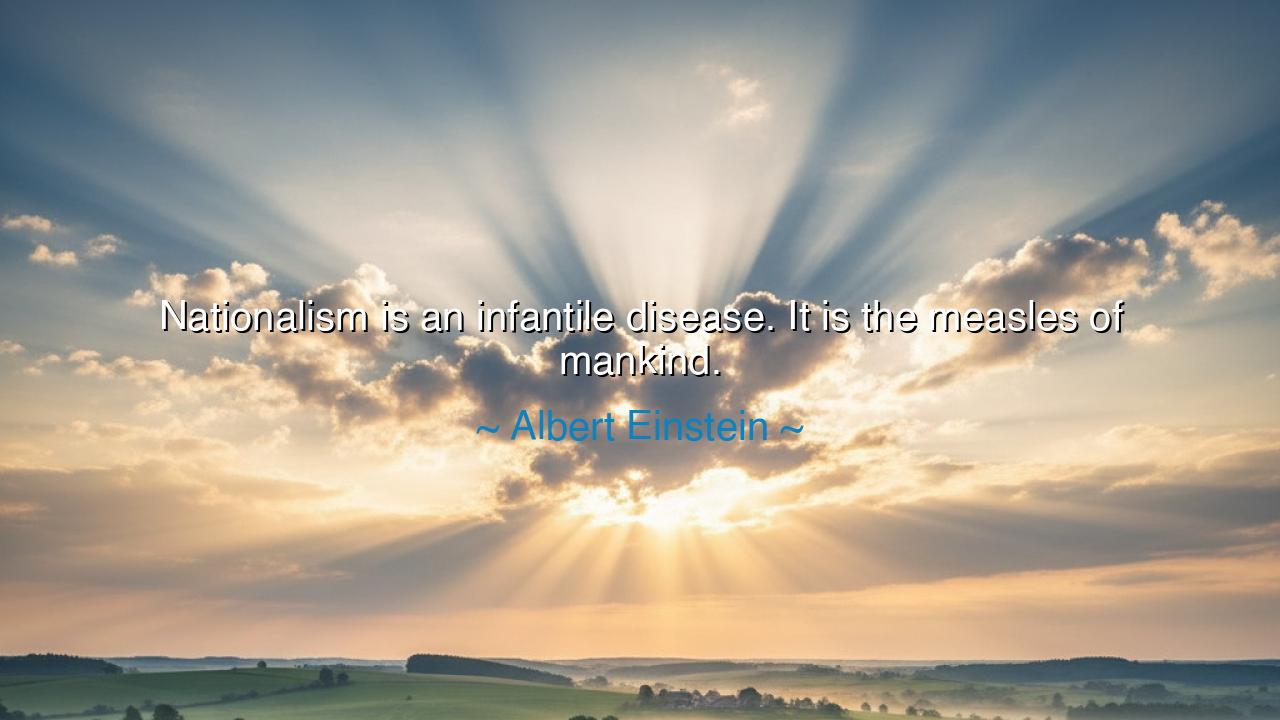
Nationalism is an infantile disease. It is the measles of






Hear the voice of Albert Einstein, the sage of science and conscience, who peered not only into the mysteries of the universe but also into the troubled heart of humankind. When he spoke the words, “Nationalism is an infantile disease. It is the measles of mankind,” he did not utter them in scorn but in sorrow. He saw in the fever of nationalism the same delirium that afflicts a child who has not yet grown into reason. It was a sickness of the soul—a blindness that led nations, once noble, into folly, cruelty, and ruin. Einstein, who had fled the horrors of tyranny and war, spoke as one who had seen the disease firsthand and wept for those still infected by it.
In calling nationalism an infantile disease, Einstein did not condemn love for one’s homeland. Rather, he warned against the sickness that turns love into worship, pride into hatred, and belonging into blindness. The healthy man cherishes his country as he would his family, with affection and duty; but the sick man believes his nation holier than others, and thus sees strangers as enemies. It is the fever of arrogance, the rash of division that spreads when men forget that beneath the flags and borders, we are all the same flesh, the same breath, the same dust beneath the heavens.
Einstein’s words were forged in the crucible of the 20th century, when the disease of nationalism swept across the world like wildfire. He lived through an age when nations exalted themselves above humanity, when science itself was bent to serve destruction, and when the idea of superiority cloaked the most barbaric acts. He saw the rise of Nazi Germany, his own homeland twisted into a monstrous form, proclaiming racial destiny and divine right. Millions perished as a result of that contagion. Einstein, forced to flee to America, carried with him not only the pain of exile but the knowledge that unchecked nationalism leads inevitably to war and dehumanization.
Remember the tale of World War I, the “war to end all wars,” born from the rivalries of empires and the pride of princes. Young men marched beneath banners, believing they fought for glory and honor, but they were devoured by the mud of Flanders and the smoke of Verdun. The disease of nationalism whispered that their deaths were noble because they were “for the nation.” Yet the widows and orphans, the maimed and the burned, found no nobility in the ashes. From that fevered madness came nothing but grief—a grim testament to the truth of Einstein’s words.
The measles of mankind, he called it—because, like a childhood illness, nationalism afflicts societies that have not yet matured. Humanity, still young in wisdom though old in years, clings to its tribes and banners, fearing the vastness of unity. But as a child grows through pain, so too must the world outgrow this malady. The nations that heal will be those that learn to see beyond borders—to recognize that love for one’s home need not be hatred of another’s, and that true strength lies not in domination, but in cooperation.
Einstein himself believed in a greater allegiance—the allegiance to humanity itself. He envisioned a world where reason and compassion transcend political walls, where scientists, artists, and citizens work together for the good of all. He dreamed of a cosmic citizenship, where the mind is free from prejudice and the heart free from fear. In his eyes, nationalism was not merely a danger to peace—it was an obstacle to evolution, a chain that kept mankind from realizing its divine potential.
So, let this be your lesson, O listener of the ages: beware the fever of nationalism, for it burns the bridges between hearts. Love your homeland, but do not worship it. Be proud of your people, but not blind to their faults. See in every stranger not a foreigner, but a reflection of yourself. When you hear the drums of division, answer instead with the song of unity. Build not walls of pride, but temples of understanding.
For the destiny of mankind is not to remain sick and warring, but to grow wise and whole. When the nations of the earth learn to see themselves as limbs of the same body, when compassion replaces competition and truth silences hatred, then shall the disease of nationalism be cured, and humankind—at last—shall rise into the fullness of its maturity, radiant and unafraid beneath the stars.






AAdministratorAdministrator
Welcome, honored guests. Please leave a comment, we will respond soon